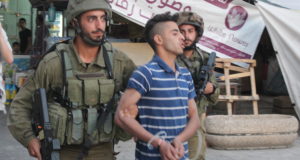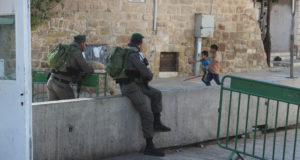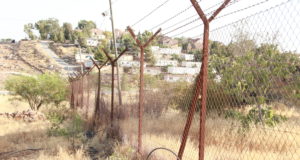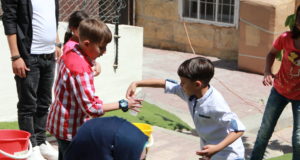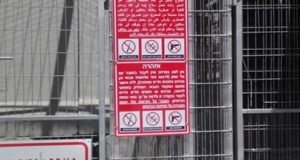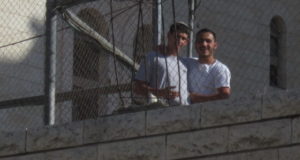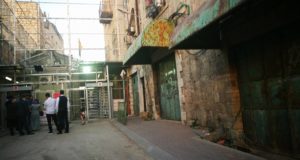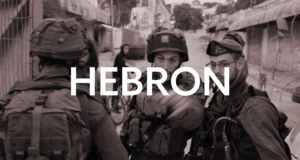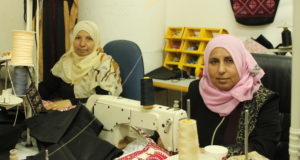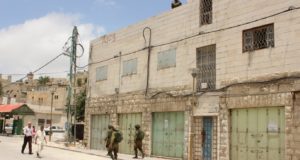18th July 2017 | International Solidarity Movement, al-Khalil team | Hebron, occupied Palestine Israeli soldiers have arrested 19 year old Ahmed Fayez in Hebron’s Old City. The teenager was working with friends when soldiers approached the group, demanding to see ...
Read More »Apartheid illustrated: Israeli soldier shoots another soldier in Hebron
6th July 2017 | International Solidarity Movement, al-Khalil team | Hebron, occupied Palestine On Tuesday, 4th July 2017, Israeli forces were conducting a ‘military training’ in a civilian Palestinian neighborhood near Gilbert checkpoint in Tel Rumeida in occupied al-Khalil (Hebron). ...
Read More »A day in Umm al-Kheir, threatened by demolition by Israeli forces
29th June 2017 | International Solidarity Movement, al-Khalil team | Hebron, occupied Palestine Our day in Umm al Kheir started with a common flying checkpoint, set up by the Israeli forces in Zif. Our mini-bus driver dind’t want to pass ...
Read More »Eid celebration for children in Tel Rumeida, occupied Hebron
29th June 2017 | International Solidarity Movement, al-Khalil team | Hebron, occupied Palestine On Tuesday the founders of the Tel Rumeida Garden next to the Gilbert checkpoint in occupied al-Khalil (Hebron) organised an Eid celebration for the children from the ...
Read More »Life imprisoned in a ‘closed military zone’: “Daily Life”?
26th June 2017 | International Solidarity Movement, al-Khalil team | Hebron, occupied Palestine Israeli forces at Shuhada checkpoint in occupied al-Khalil (Hebron) have put up yet another sign ‘instructing’ the Palestinian residents on their behavior at the checkpoint. The bright-red ...
Read More »Israeli forces shoot at and arrest 14-year old boy in Hebron
26th June 2017 | International Solidarity Movement, al-Khalil team | Hebron, occupied Palestine A fourteen year old Palestinian boy was shot at by settlers and soldiers before being arrested on the 25th June at 4:00 pm outside Bab al-Baladiya, the ...
Read More »Palestinians celebrating Eid in a ‘closed military zone’
26th June 2017 | International Solidarity Movement, al-Khalil team | Hebron, occupied Palestine As anywhere all over the world, Palestinian Muslims are celebrating the end of the fasting-month Ramadan with the 3-day feast of Eid. Eid usually is a joyous ...
Read More »Palestinian Activist Detained In Hebron
A 22 year old Palestinian activist was detained in al-Khalil this morning. He was held and interrogated for thirty minutes, before being escorted through the Shuhada Street checkpoint. He was released after another half hour with no charge, but was told ...
Read More »Resistance and empowerment in al-Khalil’s women’s cooperative
ISM met with the founder of al-Khalil’s largest women’s cooperative to discuss business, the occupation and women’s empowerment. Idhna is a small town to the west of al-Khalil, located less than a kilometre from the separation wall that divides Israelis ...
Read More »Soldiers detain 12-year old child in al-Khalil [VIDEO]
A 12-year old Palestinian boy was detained by Israeli armed forces this afternoon in Hebron’s Bab al-Baladiyya military base. The boy was apparently targeted by the soldiers, who were interrogating passers-by on his whereabouts. When he was identified, the heavily-armed ...
Read More » International Solidarity Movement Nonviolence. Justice. Freedom.
International Solidarity Movement Nonviolence. Justice. Freedom.
